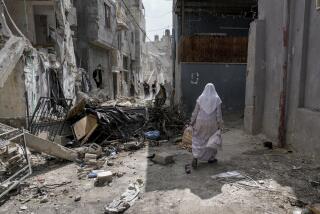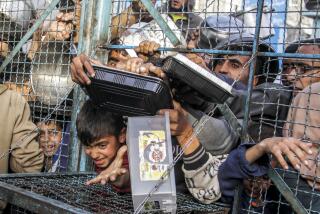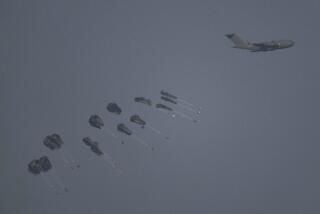As Israeli doctors aid Syrians, humanitarianism trumps geopolitics
SAFED, Israel — The 9-year-old Syrian boy with no legs wheeled himself down a bright hospital corridor, stopping to accept a pain pill from one nurse and a high-five from another.
He has been here for a month, ever since a Syrian government warplane flew low over his village and dropped a bomb that killed two of his cousins and blew apart his lower limbs.
Both legs had been amputated by an overworked doctor in an improvised clinic in a cellar. The next day, the boy’s grandmother took him and several other injured family members to the Golan Heights border half an hour away and asked the Israeli soldiers on the other side for help.
As civil war rages in Syria, with an estimated 130,000 people killed and millions displaced after nearly three years of fighting, Israel has been quietly providing aid to some of the wounded. Since the effort was launched by the Israeli army, officials say, more than 700 Syrians have received treatment at medical centers in Israel or at a field hospital operated by medics along the heavily fortified border.
Patients have come from as far away as Homs, three hours to the north. Not all are war victims, said Oscar Embon, the director of the hospital in Safed, where the boy is being treated. The facility recently hosted four healthy women who crossed the border to give birth and then returned.
The endeavor has cost about $17 million so far, officials say, and has been praised as a triumph of humanitarianism over geopolitical concerns. After all, Israel and Syria are bitter foes that have fought three bloody wars.
“We are saving the lives of our enemies,” said Col. Tarif Bader, chief medical officer for the Israel Defense Forces Northern Command.
But in recent weeks, some local and international human rights groups have been calling on Israel to do more as reports emerged that a 17-year-old girl was returned to Syria after Israeli courts rejected an asylum petition she filed asking to be transferred to relatives in a third country.
Hadas Ziv, public outreach director for Physicians for Human Rights-Israel, said that her country’s relief efforts are laudable, but Israel should also help people relocate to third countries, offer asylum and step up material aid to Jordan, Turkey and Lebanon, which have absorbed the bulk of the war’s 2.2 million refugees in teeming camps.
“If you think about 700 people out of 2.2 million, it’s a drop in the ocean,” Ziv said of Israel’s aid. Many of those who return to Syria can’t get necessary rehabilitative care and continue to be in grave danger, she said. “Syria is a killing zone.”
Yigal Palmor, a spokesman for Israel’s Foreign Ministry, said that his government has provided some assistance to Jordanian refugee camps but that wider efforts have been hampered by the “sheer hostility toward Israel” across the region. He said Israel is treating Syrians because it’s the right thing to do, and that those treated aren’t seeking asylum and want to go home.
The 9-year-old boy is one of 17 Syrians being treated at Rebecca Sieff Hospital in Safed, an artsy mountain outpost in northern Israel known as a center of the Jewish mystical practice of kabbalah.
His grandmother asked that the family not be named because she fears retribution in Syria for traveling to Israel.
Safed, about five miles west of the Israeli-occupied Golan Heights, is roughly 25 miles west of the war zone. It is also only about 10 miles southeast of Lebanon. During Israel’s 2006 war with the Lebanese Shiite militia Hezbollah, rocket fire killed civilians here and a mortar round struck the hospital, shattering windows and injuring several people.
The stream of wounded Syrians has changed the feel in the hospital’s wards and especially the lives of its Arabic-speaking staff.
Fares, a tall social worker with slicked-back hair, was in the hospital’s dialysis center last February when the first group of Syrian patients arrived. An Arab Christian, he was asked to interpret. Since then, he has worked nearly around the clock as a counselor, translator and messenger for the more than 300 Syrian patients who have been treated at the hospital. He receives texts from people as far away as Turkey seeking updates on the condition of their loved ones.
Fares, 36, who asked to be identified by only his first name because he also is concerned about backlash, was in the emergency room when the 9-year-old, a skinny kid with long eyelashes, was brought in. The boy cried for two days, at times shouting in panic that he didn’t have money to pay for the medical treatment. Doctors calmed him with sedatives.
He is doing better now, staff members say, thanks in part to the bond he has forged with Fares.
On a recent afternoon, the pair sat together on the floor of the crowded ward for wounded children. Fares played along as the boy and one of his cousins, who also lost a leg in the bomb attack, threw a red plastic ball repeatedly against his head. The kids hung on him as he talked, grabbing at his big hands and picking at the dried gel in his hair.
They have little interest in the bags of donated chocolate, socks and toys he brings around, Fares said. “They don’t want money, they don’t want cakes. All they want is touch.”
Most of those treated here are men. Although the staff doesn’t ask about their loyalties and the army doesn’t let journalists interview them, it is assumed that they are rebel fighters in the opposition Free Syrian Army or other affiliated rebel groups who can’t seek medical treatment in Syrian government hospitals. None of those cared for in Israel have worn Syrian army uniforms, officials say.
The men are kept together guarded by Israeli soldiers in two rooms that overlook a hazy valley and the Sea of Galilee. “They tell me about fighting,” Fares said, “and about killing, also.”
Israel’s border with Syria has been mostly quiet since the end of the 1973 war, in which Syria tried unsuccessfully to recover the Golan Heights, which it had lost to Israel six years earlier. A United Nations peacekeeping force, including a large battalion from the Philippines, now patrols in trucks and tanks along a newly built metal fence on the eastern border of the Heights.
On the Israeli-controlled side, cows graze in pastures, farmers tend to apple orchards and families drive down well-paved streets lined with modern shopping centers. To the east, Syrian government forces loyal to President Bashar Assad battle rebels with the Free Syrian Army and other groups, including some affiliated with Al Qaeda. The government has control of the only official border crossing into the Heights, at Quneitra; other stretches are held by rebels.
Explosions can be heard and clouds of smoke seen from the top of Bental Mountain in the Heights, a favorite Israeli sightseeing spot that offers breathtaking panoramas of a vast patchwork of Syrian farmland.
An American tourist taking it in recently, Carly Miller, 25, branded the experience surreal. “From up here it seems peaceful,” she said. “But down there you know it’s not.”
Israel has condemned Assad for using chemical weapons and has occasionally targeted weapons transfers from the Syria government to Hezbollah. Otherwise, it has remained on the sidelines — except for the medical assistance.
“Israel is not in the center of this storm,” said a senior military source who spoke on condition of anonymity. “And we don’t know where it’s taking us.”
The official acknowledged that he hoped the medical aid efforts would win Israel favor with some of its closest neighbors, no matter the war’s outcome. But an activist with the Syrian opposition who has not received treatment in Israel said the country’s efforts are not winning hearts or minds.
“We were and remain enemies,” the activist said. “The original residents [of Golan Heights] remain mournful over their land, which was stolen in front of their eyes.”
The grandmother of the 9-year-old with no legs said she has only gratitude for the Israelis. She said previous wars against Israel were waged by Syria’s leaders, whom she called monsters, “and not by us.”
In a few days, she and her grandson will be driven to the border at the east end of the Golan Heights to be dropped off. He has been fitted with two prosthetic limbs that were donated, via Fares, by a Muslim citizen of Safed. If all goes well, the boy may be able to walk again, though he will probably never play soccer, his favorite sport.
When asked what going back will be like, the woman, 63 and dressed in a simple black velvet caftan, threw her hands into the air. She said she didn’t know whether the family has a home to return to.
Times staff writer Raja Abdulrahim in Los Angeles contributed to this report.
More to Read
Start your day right
Sign up for Essential California for news, features and recommendations from the L.A. Times and beyond in your inbox six days a week.
You may occasionally receive promotional content from the Los Angeles Times.







